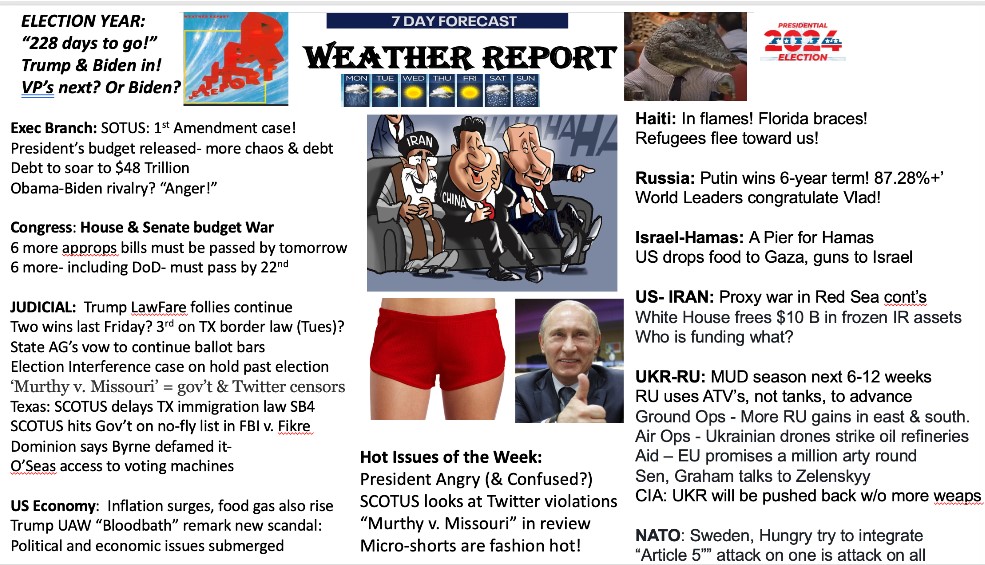
(What is the caption to this strange melange of “reports” and alleged “news?” “This stuff is all going on? The staff spent the afternoon updating the updates. Images provided at low-resolution for identification purposes only).
There is political stuff all over this week. Our favorite is not the one going on here, interesting though it is with the major parties apparently having decided their top-of-the-ticket candidates going into their respective conventions some months hence. It is a little different in Russia, where President Putin snagged another six year term with a little over 77% approval rate from a pool of 76 million voters.
The big deal in this one? Maybe a way to peace. Arrias gave us a full report on what Mr. Putin described in his victory speech: “He spoke of a “buffer zone between Russia and Ukraine.” In one ear it sounds like establishing a Demilitarized Zone (DMZ) the like of which has kept the peace since the end of the Forgotten War nearly sixty years ago.
Arrias attempts to make a distinction memes, asking if it is nonsense or a serious gesture? As a military professional, he highlights some of the
obvious issues as to what is possible. Could a buffer zone be made wide enough so weapons can’t cross it? That is an obsolete notion now that the Ukrainians already possess weapons that have penetrated 500 miles into the Russian homeland.
Whether that set of numbers can provide a peaceful framework is unknown. The arsenals filled with the old high-tech have been drawn down across the world, depleting inventories built for the Old Cold. Could a De-Militarized Zone (DMZ) provide an interim, albeit longstanding, solution to the war?
We have mentioned the expanded list of NATO members that have joined since the Warsaw Pact disintegrated. It is still disconcerting to see Estonia, Lithuania, Poland and Sweden as nations now covered by Article 5, the NATO charter provision that stipulates and “attack on one is an attack on all members.”
Despite Mr. Putin’s victory remarks, the alternative is to continue the war. Putin now has six more years of assured power. He cannot be forced from office and can arguably continue the war for as long as he lives.
There is plenty of controversy on whether proposals for a DMZ and uneasy peace could work. His election could enable the Kremlin to impose a full wartime economy and harvest the advantage of population and gross domestic product to replenish the Russian arsenal and army.
The Ukrainians can play that strategy as well. Could a UKR battle force with an additional half million troops (bringing their force to 1.4 million, total) force Russia out of the occupied territory in 2025? Could that include Crimea, lost in 2014?
Arrias predicts such a Ukrainian counter-attack might begin next winter, with duration that might last 6 months. That is a tough road ahead, regardless of which one is taken.
And there is a question that needs to be answered regardless of which path is chosen. If Russia were to defend Crimea, would that cross a Putin Red Line on a response using a nuclear weapons for the safety of Mother Russia? What would be the NATO response?
Copyright 2024 Arrias and Vic Socotra
www.vicsocotra.com
